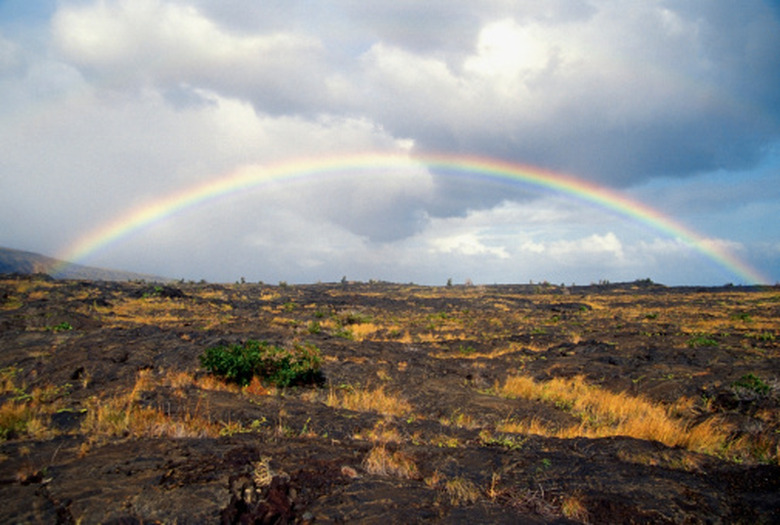Volcanic Rock Types By Mauna Loa
One of the most conspicuous geological features on the planet Earth is the Mauna Loa volcano. The volcano bubbles and spews red-hot molten rock from its summit crater on a regular cycle. Lava lakes build up in the crater until they spill over the edge to form the area's indigenous rock types. Major eruptions eject the rocks far and wide over Hawaii island.
Mauna Loa
Mauna Loa
According to the United States Geological Service, Hawaii's Mauna Loa is Earth's largest volcano. It's also one of the most active on the planet, with 33 historical eruptions since its first one in 1843. The most recent eruption was in 1984. The massive volcano rises almost 2.5 miles above sea level. The volcano measures 56,000 feet from its ocean floor base to its summit. The 74.5-mile-long volcano covers half the island of Hawaii.
Timeline
Timeline
Mauna Loa spews out molten magma that determines the rock types for Hawaii island. Scientists estimate the volcano first erupted between 1 million and 700,000 years ago. Its oldest dated rocks are 100,000 to 200,000 years old. About 98 percent of the volcano's surface is covered with basaltic rock lava flows that are radio-carbon dated at less than 10,000 years old. Mauna Loa continues to grow and provide lava rock for Hawaii, although its rate of growth has slowed in the last 100,000 years.
Lava
Lava
Mauna Loa is categorized as a shield volcano, with mountain slopes built up by numerous fluid lava flows. The flows are of two main types from the volcano's eruptive summit caldera. Pahoehoe sheets covering the volcano's northwest and southeast flanks are smooth formations from slowly moving lava. Roughly textured a'a flows are from rapidly moving lava. When it cools the lava forms a rock type called tholeiitic basalt. Lava flowing from Mauna Loa's rift zones are called picritic melts and are composed of olivine-rich basalt known as picrites.
Tholeiites
Tholeiites
Tholeiites are a type of basalt generated by subduction of the Earth's tectonic plates underneath Mauna Loa. Tholeiitic basalt has a fine-grained intergranular groundmass lacking olivine. The extrusive igneous rocks are melted layers of the Earth's crust formed deep below the surface. The primary components of tholeiitic basalt are plagioclase feldspar, clinopyroxene and iron ore. The rocks have a low silica content and range in color from black, gray and dark green to reddish brown.
Cite This Article
MLA
Whitmer, Phil. "Volcanic Rock Types By Mauna Loa" sciencing.com, https://www.sciencing.com/volcanic-rock-types-mauna-loa-8059168/. 24 April 2017.
APA
Whitmer, Phil. (2017, April 24). Volcanic Rock Types By Mauna Loa. sciencing.com. Retrieved from https://www.sciencing.com/volcanic-rock-types-mauna-loa-8059168/
Chicago
Whitmer, Phil. Volcanic Rock Types By Mauna Loa last modified August 30, 2022. https://www.sciencing.com/volcanic-rock-types-mauna-loa-8059168/
